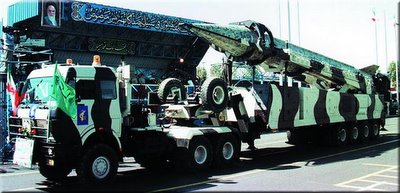
World Net Daily coverage of former Speaker Gingrich's testimony before a subcommittee of the Senate Homeland Security and Governmental Affairs Committee last weekhere:
Gingrich pointed with alarm at a report first published in G2 Bulletin that Iran had tested the firing of ballistic missiles from a merchant ship in which warheads were detonated in midair over the Caspian Sea rather than at a land or sea target. National security experts and scientists commissioned by Congress to study the threat of electromagnetic pulse attacks on the U.S. concluded that Iran was preparing for just such a scenario. So does Gingrich.Earlier posts on the EMP threat, missiles and merchant ships here, another threat, and cruise missile threat here. On how EMP works here and here. And A July 2004 report on the threat here. Photo is of Iran’s Shahab 3, on launcher for a parade. (source).
"In short, a country with a track record of carrying out its murderous ideology may soon have the capability to deliver on its publicly declared and unambiguously stated intentions to inflict mortal harm on the United States on a massive scale," warned Gingrich last Tuesday at the hearing of the Federal Financial Management, Government Information and International Security Subcommittee chaired by Sen. Tom Coburn, R-Okla. "A nuclear tipped intermediate-range Iranian missile launched from a merchant ship off the coast of the United States could do just that. That, or Iran could simply supply its terrorist handmaidens with a small scale nuclear device to use against U.S. targets here at home or abroad."
The threat is compounded by recent disclosures by the International Atomic Energy Agency that Iran is in "non-compliance" with its treaty obligations against developing nuclear weapons...
...Gingrich said there are reasons to believe Iran "is testing the capability to launch a surprise attack on the United States from a merchant ship of our coasts."
"An attack by a single Iranian nuclear missile could have a catastrophic impact on the United States by causing an electromagnetic pulse (EMP) over a portion of the country," he said. "Such an attack could quickly turn a third or more of the United States back to a 19th century level of development. Electrical transformers and switching stations would fall. Without electricity, hospitals would fails, water and sewage services would fail, gas stations would be unable to provide petroleum, trucks would not be able to distribute food supplies, and essential services would rapidly disintegrate."
Gingrich said "this is not idle speculation, but taken from the consensus findings of nine distinguished scientists who authored the Report of the Commission to Assess the Threat to the United States from Electromagnetic Pulse (EMP) Attack, which was delivered to the Congress on June 22, 2004, the same day the 9-11 commission report was published."
Gingrich pointed out that such a sneak attack – especially if launched from a merchant ship at sea – could have the added benefit of deniability by Iran.
"Contemplating an EMP threat makes more troubling reports that certain Iranian missile tests resulted in missiles that have detonated in flight at or near apogee, which the Iranian press has reported as successful events," explained Gingrich. "Normally, it would be expected that the ability to target specific locations would be the standard for success for ballistic tests. However, if the ability to launch an EMP attack was being tested, detonation at apogee would be the measure of testing success. As noted by the EMP commission, a country with limited nuclear capabilities and few choices as to delivery platforms has only a few options to deliver a deadly blow. An EMP attack would be on such strategy."
Some of Iran’s tests of its Shahab-3 had been terminated before the completion of their ballistic trajectories, that is, exploding in mid-flight by what appeared to be a self-destruct mechanism. Iran has nevertheless described the tests as fully “successful.” Pry noted that the apparent contradiction would make sense “if Iran were practicing the execution of an EMP attack.” Lowell Wood is quoted as having testified to the subcommittee that such an attack upon the United States could keep off most electrical functions for a time period of a few hours or decades, depending on how it was executed. Wood also warned the subcommittee that such an EMP warhead could be delivered against the United States by “a Scud missile launched from a freighter off the Atlantic coast.”says MISSILETHREAT.com here.
The "E-bomb and terrorist threat" here from a 2001 article in Popular Mechanics. Under $400? Yikes.

No comments:
Post a Comment